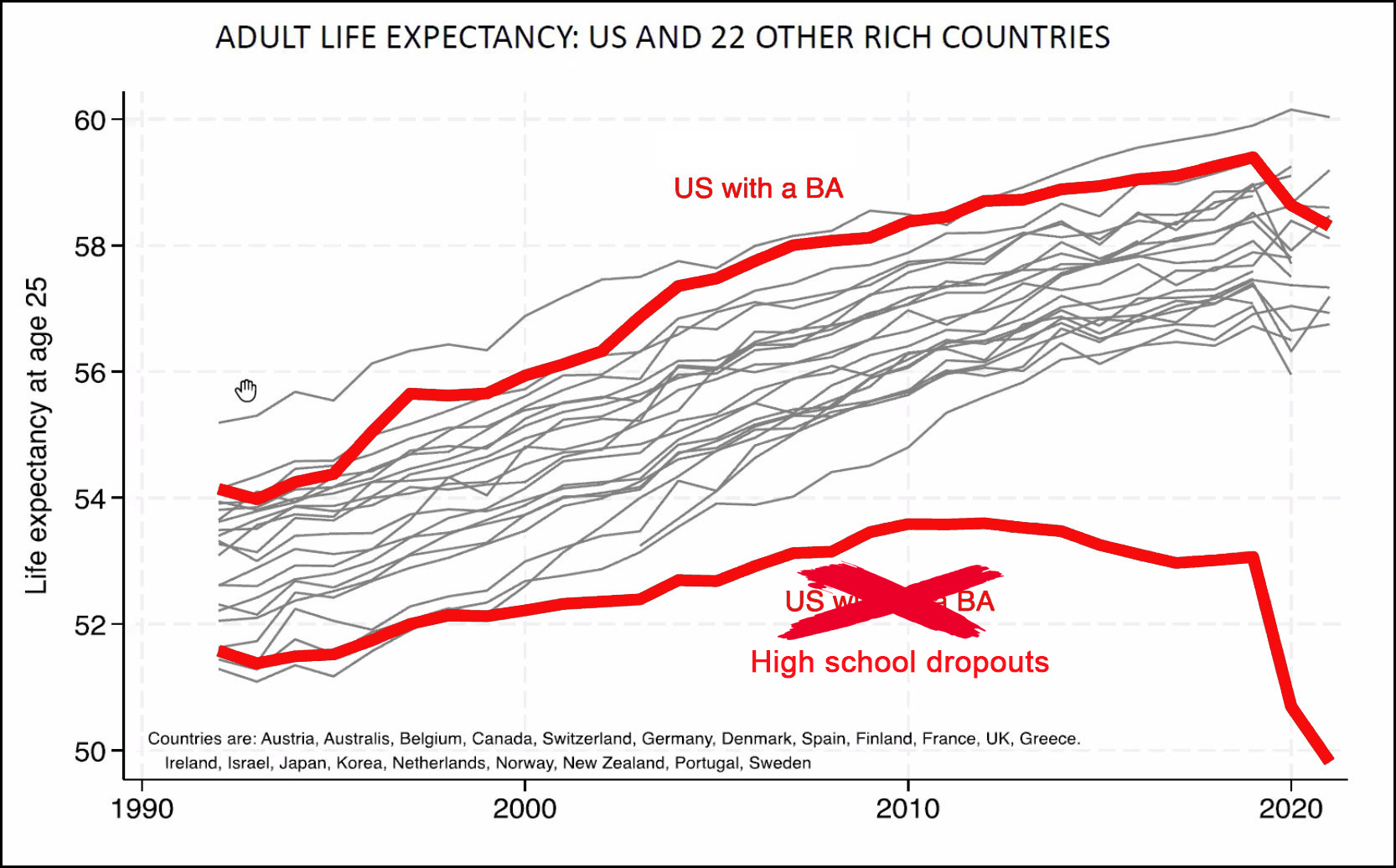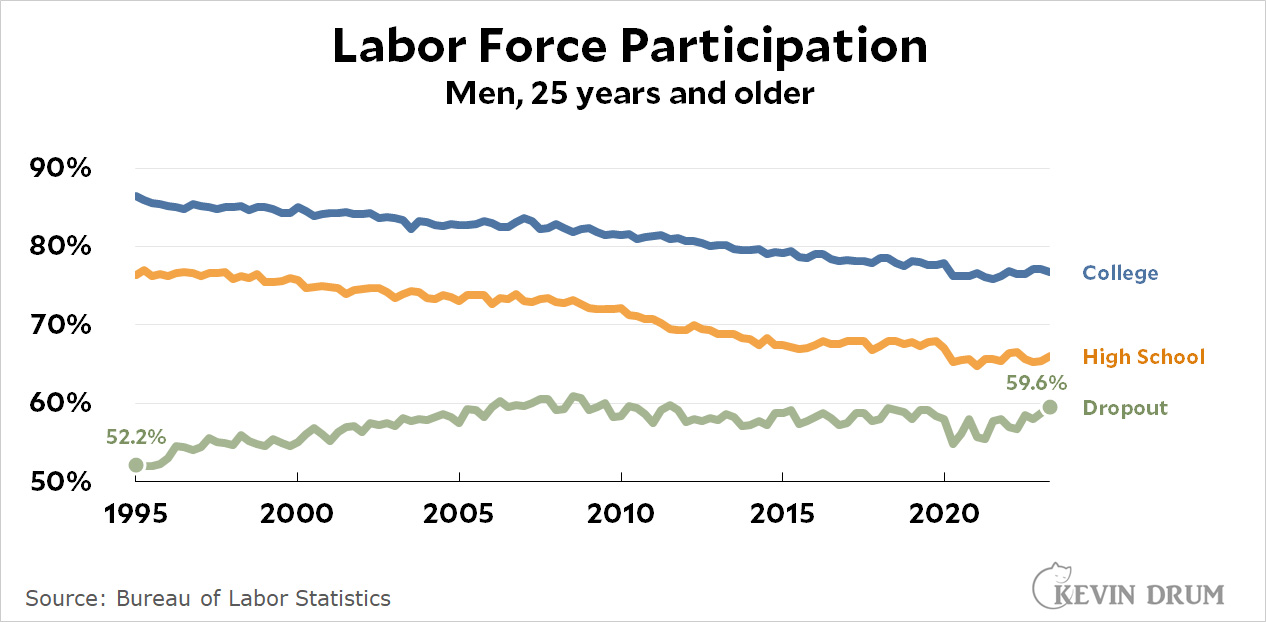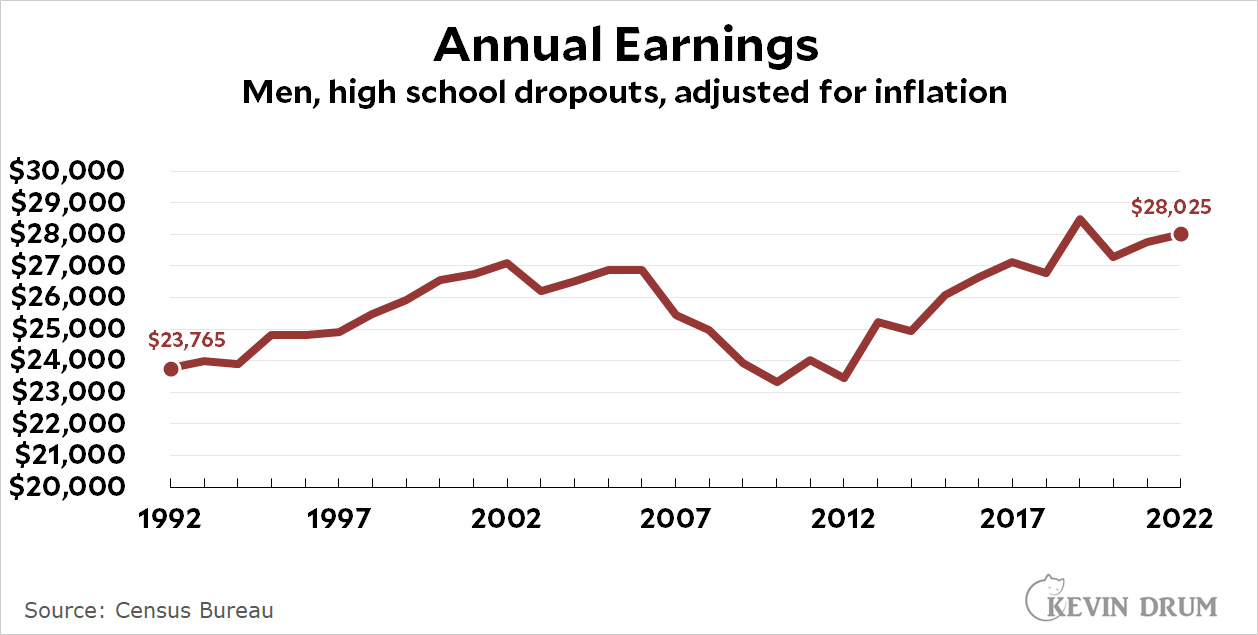The Washington Post is running a series of pieces about declining life expectancies in the US, and it reminds me of this chart:
 The real problem with falling life expectancies is with high school dropouts, not just everyone without a BA. That got me curious about the economic decline of high school dropouts. I was (very) surprised to discover this:
The real problem with falling life expectancies is with high school dropouts, not just everyone without a BA. That got me curious about the economic decline of high school dropouts. I was (very) surprised to discover this:
 Among men, participation in the labor force has been dropping for decades. But among high school dropouts, it's been going up. It's nearly eight points higher today than it was 30 years ago. Here's income:
Among men, participation in the labor force has been dropping for decades. But among high school dropouts, it's been going up. It's nearly eight points higher today than it was 30 years ago. Here's income:
 Income is up too. High school dropouts took a big hit during the Great Recession, but so did everyone else. Overall, their real incomes are up 18% over the past three decades.
Income is up too. High school dropouts took a big hit during the Great Recession, but so did everyone else. Overall, their real incomes are up 18% over the past three decades.
It's worth noting that US life expectancies among dropouts started to diverge from other countries around the year 1998. But looking at both income and labor force participation, nothing happened at that time. Both continued a steady march upward that lasted until the Great Recession.
Whatever the cause of dropping life expectancies among the poorly educated, it's not economics. At least, it sure doesn't seem like it. So what was it? What changed in 1998 and stayed changed for the next 25 years?

To my naive eyes, the life expectancy gap opens up around 1993 to 95 where the slopes diverge noticeably.
Have to wonder where race fits into the picture, and possibly changed patterns of drugs availability/consumption/war on drugs in that period, both in how the gross statistic is generated and what population segments are driving the change.
"OxyContin was developed and patented in 1996 by Purdue Pharma L.P. and was originally available in 10 milligram (mg), 20 mg, 40 mg, and 80 mg tablets. A 160 mg tablet became available in July 2000."
https://www.justice.gov/archive/ndic/pubs/651/backgrnd.htm
you looked that up faster than I
😉
I was going to suggest it was related to opioids.
It's possible that high school dropouts might have more labor intensive jobs that lead to more on-job injuries which could lead them to getting hooked on pain killers. Or higher stress could lead to more drug use.
It's possible that high school dropouts might have more labor intensive jobs
Not just possible—overwhelmingly probable. Surely someone without a high school diploma is a lot more likely to be working at a warehouse or doing construction or landscaping than the rest of men (which would include large number of college graduates).
And yes, that would render injuries more common—as well as prescriptions for painkillers.
Opioid use strikes me as the most likely culprit.
Is there an assumption here that the "dropouts" category is homogeneous over time? E.g. suppose the reasons for dropping out slowly changed. To what extent did people who were well equipped to complete high school stop dropping out, increasing the percentage of dropouts who had, say, relatively serious medical issues. ? Meanwhile, society became better capable of providing jobs to the dropouts?
Did HS graduation rates increase significantly in the 1990s?
Quick googling shows they've increased in the 2000's, or rather the noncompletion rate has declined from 16 to 10 percent.
"Between 2000 and 2017, the percentage of all people age 25 and older who had not completed high school decreased by more than one-third, dropping from 16 percent to 10 percent." https://www.census.gov/newsroom/press-releases/2017/educational-attainment-2017.html
Figures before 2000 harder but see this: https://www.census.gov/content/dam/Census/library/publications/1996/demo/p20-489.pdf
Opiod use. Oxycontin was introduced in 1996.
https://www.ncbi.nlm.nih.gov/pmc/articles/PMC2622774/
Street drugs get used if you can't afford prescriptions anymore. Then fentanyl kicks in.
Just a friendly reminder that ADHD has a much stronger influence on reducing life expectancy. If you solve for ADHD, you would dramatically adjust US life expectancy across all stratifications.
D_Ohrk_E1 - as someone with ADHD, and both of kids suffer from the same, do you have data to support your statement? If so, I would love to see it...
A quick Google search turned up this article:
https://www.ajmc.com/view/psychologist-barkley-says-life-expectancy-slashed-in-worst-cases-for-those-with-adhd
See ref ^
For a broader review by Dr. Barkley of the research into the subject, see: https://www.russellbarkley.org/factsheets/ADHD_Likely%20_Reduces_Estimated_Life_Expectancy_Barkley.pdf
Having done some superficial research through a handful of books and papers, the "neurodiverse" label seems to minimize the health issues posed by untreated ADHD, which Dr. Barkley refers to as a disorder. I'm inclined to believe it is less neurodiversity and more a disorder.
So far the WaPo is saying that the main reason for the decline is chronic health problems. Is opioid use a chronic health problem or related to such problems?
What I suppose is the introductory WaPo piece (not behind paywall):
https://wapo.st/3LJ9vkH
doesn't really say much. Maybe there will be more real data in additional pieces or maybe not. There are many things that would have to be investigated.
So, high school dropouts are working more, but are somehow dying at a greater rate?
Have you included the "accidental" suicide statistics? I mean, have you ever had a job where you wanted to shoot yourself?
I generally like to work, but before I started my first company (because I discovered that I hate working for someone else), I had some really terrible jobs and a few really close brushes with the wings of the Angel of Death.
Ever since I started living my life on my own terms, my habits have improved and I've been insufferably healthy (and lucky!) But before then, well, I could show you my scars and X-rays.
The rise of right-wing media, particularly Fox News and online hate media.
How? It made millions of people angry, which leads to all kinds of destructive behavior.
Welfare reform matches the timeline, but the should be a lag of some kind.
Likely the makeup of the HS dropout group has changed quite a bit over the years. Did the healthiest HS drop outs of 1996 become the graduates of today?
As for "real incomes being up 18% over the past thirty years", well, when your weekly pay goes from $100 to $150 in thirty years, even adjusted for inflation, you are still going to be insanely broke.
"Income is up too. High school dropouts took a big hit during the Great Recession, but so did everyone else. Overall, their real incomes are up 18% over the past three decades."
I suspect the charts are misleading. There has been a tremendous rise of Americans on disability: the disability roll has risen from about 3 million in 1990 to approximately 10 million today. Further, the overdose deaths are concentrated in the lower income groups.
Folks on disability, or not alive etc, are not counted in Kevin's chart and I BET (I do not have a figure) a lot of these folks were lowish income earners before going on disability.
https://www.ssa.gov/policy/docs/statcomps/di_asr/2021/sect01.html
Yeah, that's what I suspect as well. The lower life expectancy is primarily driven by high school dropouts who aren't in the labor force because they're on disability, homeless, etc. Those are the people who most lack access to healthcare and are more likely to be substance abusers.
Wonder if there is an interaction with geography. Could high school dropouts be disproportionately located in poor rural communities that have lost access to many types of specialists and hospitals?
Maybe it's several factors that impact health. Over those years the obesity rate has gone up, as has the amount of ultraprocessed food people eat. You also have meth addiction followed by opioids.
Those all contribute to health problems, and the problems are often most dire for the poorest.
Pay may be up but they're still grinding away at meaningless jobs day after day, like grinding out levels in a video game just to get a useless cosmetic reward. Plus most dropouts probably don't have the mental or emotional defenses to know when their depressed brains are lying to them, telling them that everything is hopeless and will never get better. The result is suicide or accidental overdose.
Lead is always the answer.
The Post's articles make it pretty clear that obesity and diabetes are largely to blame, although the causes of that are somewhat obscure; diet must be involved, and probably heavy consumption of sweetened food and drinks.
One particularly alarming article described the prevalence of fatty liver disease among children, and not only among overweight children. Very strange.
Well, 1998 is the year Andrew Wakefield kicked the antivax movement into high gear with his bogus MMR-autism paper.
It's also the year Google was founded.
Take your pick.
Maybe start here?
https://www.cdc.gov/nchs/products/databriefs/db362.htm
US Adult Obesity Rates 2012 vs 2022,
https://i.redd.it/k8z4nixhxksb1.jpg